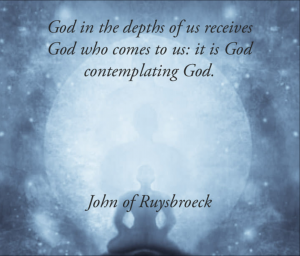 John Ruusbroec was a Flemish priest and mystic. His great work, The Spiritual Espousals, is divided into three books that integrate the contemplative and active aspects of our lives. Living in a monastic environment, Ruusbroec loved solitude, and would often walk slowly onto the grounds of the cloister and into the surrounding forest, meditating and occasionally stopping to take notes. Later in life he said that he never wrote anything down unless he felt prompted by the Holy Spirit. In his writing he focused on detachment, humility, and charity, and on the spiritual call to union with the Divine.
John Ruusbroec was a Flemish priest and mystic. His great work, The Spiritual Espousals, is divided into three books that integrate the contemplative and active aspects of our lives. Living in a monastic environment, Ruusbroec loved solitude, and would often walk slowly onto the grounds of the cloister and into the surrounding forest, meditating and occasionally stopping to take notes. Later in life he said that he never wrote anything down unless he felt prompted by the Holy Spirit. In his writing he focused on detachment, humility, and charity, and on the spiritual call to union with the Divine.
Ruusbroec follows Meister Eckhart’s understanding when he makes a distinction between Godhead and God. For Eckhart, the invisible, eternal Source of creation is the Godhead, of which we can say or see nothing. This sacred Nothing gives birth to the God we know in scripture. Godhead gives birth to God. Ruusbroec’s Trinitarian spirituality is portrayed as a journey inward to the “dark silence” of the Godhead as we undergo a thorough self-emptying in contemplative silence and a simultaneous opening of the heart to the Holy Spirit, who calls a person into loving relationships and virtuous acts of kindness. For Ruusbroec, solitude leads to service and service to solitude. He insisted that deep inner repose in a “superessential Unity” with the Divine is possible, even while one is working and serving others. Ruusbroec sees the Holy Spirit as the inner guide and harmonizer of both repose and activity, so that one doesn’t make the mistake of being too inward (Quietism) or too outward in external activity characterized by an anxious “restlessness of heart.”
The Third Person of the Trinity, the Holy Spirit, integrates the archetypes of Mary and Martha (see Luke 10:38-42). Thus, we can dwell within the deep Trinitarian unity while being active in the world, and we can be engaged in helping others while simultaneously being rooted in the ineffable “dance of Love,” the perichoresis.
For Ruusbroec, the deep integration of repose and activity is enlivened and ordered by the Spirit in each person’s heart. Everything begins with our intention to love as Christ loves. Christ’s love is like the sun, falling unconditionally upon all beings. We can step into that sun only when we let go of our self-centered views. Then, “free and unencumbered by attachments to pleasure or pain or any creature,” we open our hearts to Christ, “the glorious sun and divine resplendence… [who] enlightens, shines through, and enkindles the heart which is free, together with all the powers of the soul.”1
Ruusbroec understands the Spirit’s Presence within all people to be a fire that enkindles the heart with an interior fervor and a “felt affection” in the heart. He writes,
Felt affection and love consist in a desire, a taste, and a yearning which a person feels for God as an eternal good which includes all other goods. Felt affection lets go of all creatures [to simply enjoy] them, though not as regards making use of them to the degree necessary. Fervent affection feels itself touched from within by an eternal love to which it must always be devoted. Fervent affection easily renounces and disdains all things so that it might obtain what it loves.2

The Spirit’s action within spiritual seekers is two-fold. The Spirit enkindles devotion to the Divine and an illuminating desire to help others. Likewise, the Spirit brings a deep heartfelt humility that orders all our faculties in a dynamic, synergistic dance of love, even in the midst of suffering. The Spirit is able to integrate, synthesize and order all of our senses, emotions and intellect, because we have relinquished self-interest and binary either-or thinking. All opposites of cognition, feeling and judgment are transcended in “coincidentia oppositorum,” (Latin: “coincidence of opposites),” a concept and experience articulated by 15th-century philosopher Nicholas of Cusa).
1 John Ruusbroec, The Spiritual Espousals and Other Works, Introduction and translation by James A. Wiseman, O.S.B. (Mahwah, N.J. Paulist Press, 1985), 78.
2 Ruusbroec, Spiritual Espousals, 79.